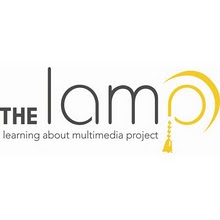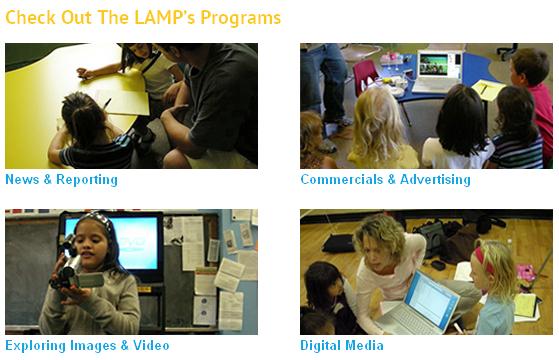 Aug. 5, 2011 In internet time, the couple of weeks that have passed since NAMLE (the Nat’l Assoc of Media Literacy Educators’ conference) may SEEM like a virtual eternity or ‘old news’ as digital educators scurry about to start up a NEW school year having picked from an infovore smorgasbord of critical thinking workshops…
Aug. 5, 2011 In internet time, the couple of weeks that have passed since NAMLE (the Nat’l Assoc of Media Literacy Educators’ conference) may SEEM like a virtual eternity or ‘old news’ as digital educators scurry about to start up a NEW school year having picked from an infovore smorgasbord of critical thinking workshops…
…But that’s part of the problem in our quick click culture. The 165 content rich workshops in the NAMLE feast may have been consumed, but they’re still not fully digested, that takes time. (check out the breadth/depth in this 36pp pdf)
Important presentations of colleagues may already be fading into a flash stick of a memory blur…The sheer overwhelm of the massive mental floss leaves people tucking swag bags stuffed with resources, slideshares, prezis, digital posters and media decks back into briefcases with “I’ll revisit the ones I missed later” and then they never do. Am I right?
Seems weighty media topics and expert speakers are getting clipped, churned up and mowed down faster than a summer lawn… It’s like the NYT article about “Long-form storytelling in a short-attention span world.” I say let’s enable the content to shine by taking the time to not just scatter seeds but to get our hands dirty and dig deeper into planting and embedding ideas enabling the fluid of the mind to nourish them.
Whether it’s NAMLE 2011 or the recent live-streaming 140EDU conference recap (great video archives) or this weekend’s BlogHer 2011. Just because an event is ‘over’ it’s far from finished. And I’m not talking about just the glad-handing follow-ups and schmoozefests of these mega-media events.
 There’s far too much effort and collective human intellect to slapdash 140 character live-stream citizen journalism coverage or a rushed ‘who posts a recap first’ urgency…The rapid-fire delivery of digital age content means all too often people ‘move on’ too fast to the next big ‘thing’ without letting the depth and layers of rich content seep into the brain, especially when there’s copious quantities of high volume content and resources to nosh upon.
There’s far too much effort and collective human intellect to slapdash 140 character live-stream citizen journalism coverage or a rushed ‘who posts a recap first’ urgency…The rapid-fire delivery of digital age content means all too often people ‘move on’ too fast to the next big ‘thing’ without letting the depth and layers of rich content seep into the brain, especially when there’s copious quantities of high volume content and resources to nosh upon.
So this will be a multi-part ‘work in progress’ recap beginning with this overview guest post by The LAMP, a worthy grassroots org of fun and clever youth-driven media makers eager to impart hands-on knowledge through free public events instilling vital critical thinking skills for 21st century young minds.
AND…btw, for the record…THIS is also why the purported demise of long form blogging is bupkiss. We need it for digging deeper.
Before you go on to ‘the next big thing’ (or conference, or any cool tool or dandy device) think about whether you’ve DONE something with what you’ve learned already.
Digital distractions and shiny pennies can usurp the core elements of knowledge building. We need to USE collaboratories like NAMLE to further all our work in critical thinking…
As internet pioneer and humanist/hero thought leader Douglas Engelbart would say, it’s all about raising the collective IQ. Onward!
Fabulous K-12 Media Literacy wfrom The LAMP Camp!
Guest Post: Young Media Minds at The LAMP Sum Up The NAMLE 2011 Experience as Both Presenters and Attendees
Critical Thinkers Who ‘Get It’– The LAMP on NAMLE
by Emily Long
It’s exciting when any group of people with a specific shared enthusiasm come together, but when that group of people is as (relatively) small as the media literacy community, it can be incredibly affirming.
This was what I found at the conference for the National Association of Media Literacy Education (NAMLE) held July 22-25 in Philadelphia. Even in the media mecca of New York City, me and my colleagues at The LAMP(Learning About Multimedia Project) often have to explain to elected officials, foundation representatives, community leaders and fellow non-profiteers not only what media literacy is, but why it is such a crucial need.
There is a certain type of eye-rolling–usually manifested by a deep sigh–that happens for me whenever I have to justify the importance of education. So, it’s invigorating to be in a room full of people who get it and act on it and keep on with the sometimes Sisyphean labor of advancing media literacy at a time when our country’s education system is being stripped to a skeleton.
Just as galvanizing as the communal spirit was the sheer number of presentations. NAMLE attendees chose from 165 workshops, screenings, panels, demonstrations and more, covering a range of topics like faith-based media literacy, Internet in rural Peru, digital storytelling, policy, media literacy in China, theory…and I could go on.
I was only able to attend the conference on Saturday and Sunday. Plus, The LAMP, represented by myself and co-founders Katherine Fry and D.C. Vito, did two presentations (one on working with elected officials, another on our LAMPlatoon ad-busting project) so although I could attend only a fraction of what I wanted, it did help to narrow down my choices.
Emily Bailin from Temple University’s Media Education Lab did a great presentation about her work with teachers at a charter school in Philadelphia, and talked about the practical realities of integrating media literacy in a diverse, urban school. I got an update on the fantastic work being done on the West coast to build digital citizenship in youth and teens (credits on this one go to Bobbie Eisenstock from California State University, Northridge; Kelly Mendoza with Common Sense Media; Meryl Alper from USC Annenberg and Erin Reilly, also with USC Annenberg).
As a news junkie, I enjoyed a primer from Paul Mihailidis of Emerson College and James Cohen of Hofstra University about the latest tools for news aggregation and literacy.
Keynote speakers Mohammed Bilal and Douglas Rushkoff were still another highlight. I was among perhaps a handful of people in the room who closely followed Bilal on the San Francisco season of MTV’s The Real World, so hearing him talk about what went on behind the scenes while making the sausage of reality television was particularly fascinating. But I was also captivated by how he combined his celebrity with his passion for peace, diversity and hip-hop to build on his experience in a positive way.
After a long night of drinking and debating with other NAMLE attendees, Douglas Rushkoff was the only reason I got up as early as I did on Sunday morning. He did not disappoint–his energy and humor was so infectious that he negated whatever need I had for coffee. I left with his “Program or be programmed!” mantra ringing in my head, a conviction that media literacy is the key to all of our problems, and the reminder of how much I still have to learn.
After our obligatory cheesesteak sandwiches, we packed up our things and headed back to Brooklyn. For The LAMP, the NAMLE experience was extra special, because it was our first. The conference is held every two years, and with The LAMP at not quite four years old, we were honored to present twice on our first trip. Still, for me, the main highlight was the media literacy community…The ability to finally meet the people behind the blogs and Twitter feeds I follow was exciting, but meeting new people and hearing about their work was inspiring as well. Meeting once every two years is definitely not enough.—Emily Long
About Emily: Emily earned her Masters of Fine Arts in Dramaturgy and Script Development from Columbia University in 2006. While at Columbia, she edited and catalogued hundreds of interviews and transcripts for the Oral History Research Office, focusing primarily on their 9/11 Project. From 2006 to early 2009, she was also the Resident Dramaturg at Electric Pear Productions where she designed and facilitated their playwriting workshop, as well as production dramaturgy. The LAMP is pleased to have Ms. Long on board as Communications Director, offering her extensive experience with numerous media through her work with Columbia’s Rare Books and Manuscript Library, Atlantic Theater Company, Sesame Workshop and Cine Mosaic to name a few. She also wrote for the Independent Film Channel’s Make Media Matter blog.
Follow The LAMP on Twitter: @thelampnyc Follow Emily on Twitter: @emlong
Follow Amy Jussel, Shaping Youth on Twitter: @ShapingYouth
Amy’s Note: The LAMP first came to my attention at Shaping Youth with their culture jamming/ad spoofs created by their “LAMPlatoon”…They literally put ‘ads on notice’ with backtalk that makes you do a doubletake…Love ’em. Great deconstruction of what’s ‘really being said’ in a straightforward, kid-friendly manner. Here are a few recent favorites of mine…
LAMP Student Violet Creates Critical Thinking Around The Highly Sexualized Bratz Dolls (I need interns like this! Go Violet! Could you do Monster High Dolls next please?–Thanks, –Amy)
A Sample of Critical Thinking/Deconstruction On Shaping Youth
Teaching Kids Media Literacy & Label Lingo
Hands-On MultiTasking Challenge/Media Literacy-My Pop Studio
The Illusionists Film About Media’s Body Blitz: NOW FUNDED!!
Girl Caught: New Moon Girls Slams Sexualization of Kids
Download New Anti-Sexualization Sticker For Culture Jamming!
Parents? Stay Ahead of the Game…Literally. (Advergaming)
Advergaming Arcades Shift Toward Virtual Villages/Kid Vid
FTC Food Marketing to Kids: Are Watchdogs All Bark, No Bite?
School Sit-Ups Sponsored By Soda & Snacks
Digital Marketing Tactics Revealed to FTC: Report At DigitalAds.org
Bogus Junk Food Bans & Bait-n-Switch Tactics Proliferate School Policy
Peer Driven Junk Food Allure & What’s Cool to Kids
The Junk Food Hydra: Ad Industry Self Regulation is Oxymoronic
Related Media Literacy Resources
NAMLE.net: National Assoc. of Media Literacy Education
Media Awareness Network: Handy chart by Chris Worsnop following each question with the core, “How do I know?” Excellent Conceptual Framework for Media Education
Questions to Ask About Media Messages: Includes partial curricula from KNOW TV compiled on media literacy pal Frank Baker’s Media Literacy Clearinghouse always on our sidebar
Researching researchers: Lessons for research ethics (abstract)
Mark Twain quote/Google Answers: Great ‘train of thought’ research thread on determining accuracy of information and how to source the real deal
Sourcewatch: Your guide to the names behind the news
MERJ: Media Education Research Journal








Speak Your Mind